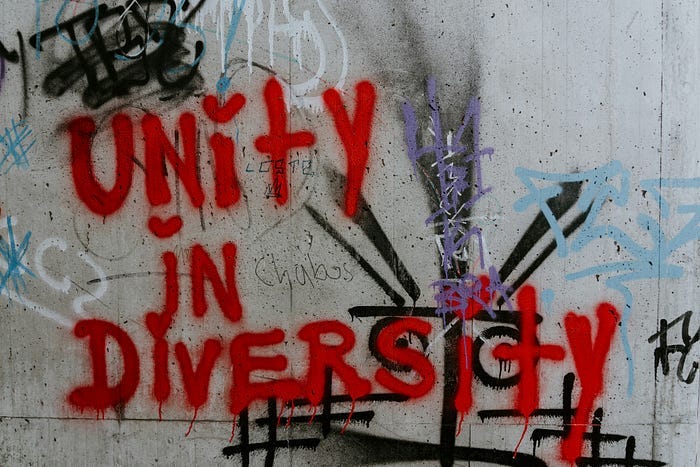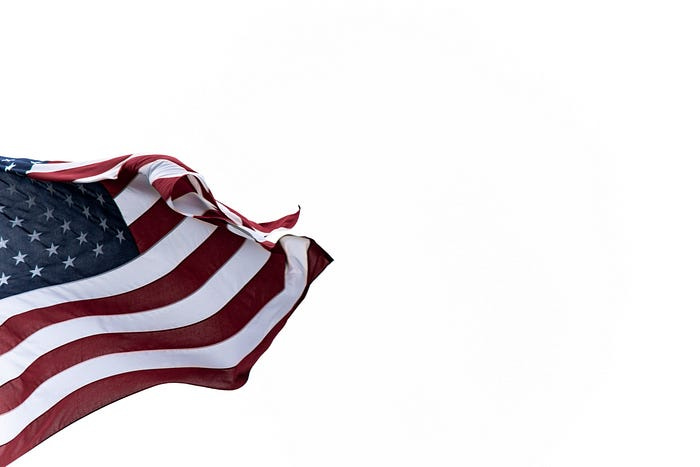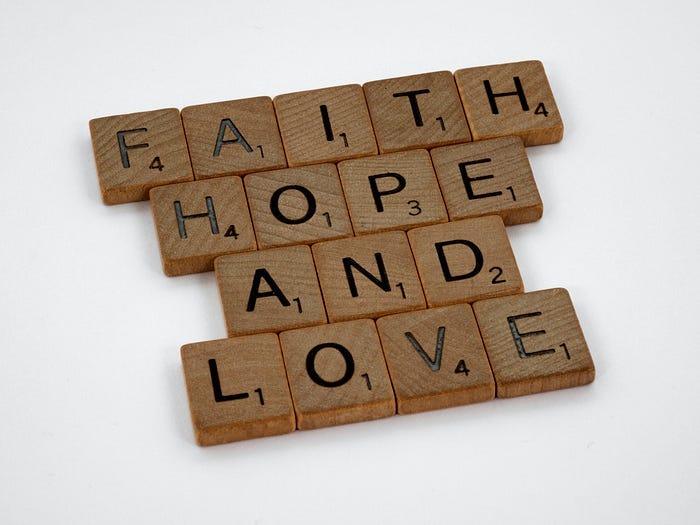Christian Nationalism is Not Patriotic, and It Isn’t Christlike
True patriotism lies in trying to better the lives of your countrymen. Wearing crosses and professing your love for Jesus doesn't make up for cruelty.

I’m not Christian. And I’m not American either, although I talk about the country a lot.
I talk about American politics so often for a few reasons. One being that I’m marrying into an American family, and many of my friends live within the country. I visit regularly, and I’m generally immersed in American culture and news as much as I can while living over the border.
But another reason is… Y’all are just more dramatic right now, to be honest. Dramatic, and fascinating.
You’ve got way more people, a very sharp ideological and political divide, the history of civil war and revolution, and current events are making it look like there’s more on the way!
Probably very soon with how rocky things are getting lately.
You’ve got a nation built by African slaves, immigrants from Europe, and hundreds of Indigenous cultures that are somehow left out of the conversation.
You are a country that proclaims freedom of religion and that all men created equal, that now has a chunk of its population calling for Christian nationalism.
Specifically, white Christian nationalism. Talk about irony.
Now, I’m Canadian. We’ve got some of the same issues you guys do, especially with ignoring our Indigenous cultures and pretending we’ve never done anything wrong.
We’ve both mastered that one.
I was born and raised in a predominantly Catholic family, although my parents weren’t really believers. My grandparents certainly were, and as a child I was surrounded by imagery of Christ on the cross, rosaries, and passages from the Bible.
I was raised to whisper a prayer before bed and I often did, at least until I decided the church wasn’t for me. I was young when I branched out and started looking for a spirituality that suited me better.
But I remember what I was taught growing up. As a result, I have some thoughts about Christian nationalism.
Suffice it to say, I am not a fan.

Thou shalt love thy neighbor as thyself (Matthew 22:37–39)
I was always taught that we should love one another. If someone holds out their hands in supplication, seeking help and comfort, we should reach our own hands out and offer them as best we can.
I was never told anything about what colour those hands needed to be.
If I had to pick the one person in my family who embodied this the most, I would have to pick my late grandfather. He loved people. He loved helping people.
My grandfather grew up hungry.
He knew how it felt to try and sleep with an empty belly as a child; he was familiar with that gnawing, clawing feeling in his stomach. Even when he was a grown man he never really filled out. He stayed slender and whip-like until the day he died.
He took that knowledge, the memory of hardship, and turned it into a passion.
My grandfather loved to feed people. He lived to feed people.
After he left his service in the Navy, my grandfather opened a deli in our small town. He was known for his sense of humour, his easy smile and constant pranks, and for his cooking.
Even after he retired and sold the store, he kept cooking. I would visit and find cartons and paper boxes and bowls of homemade meals. They’d be stacked in the front room, out in the porch, and kept hot for people to come by and pick up something to eat.
He loved to sit and chat with people in his big open sunroom with the old nautical imagery, model ships, and ‘Kiss Me, I’m Irish’ signs plastered over the walls. He loved watching people eat the meals he made, and he didn’t blink at giving food away for free.
I remember the cookie jars all over his kitchen, and the giant freezer in the back full of nothing but boxes of ice cream sandwiches. He did his best to ensure his grandkids would leave ten pounds heavier than they arrived, regardless of what our parents had to say about it.
No child in his home would ever go hungry. Nobody who came to his door would ever leave unfed.
That’s what loving your neighbour looks like. Never wanting anybody to struggle the way you struggled, and being willing to put your money where your mouth is to see it through.
Loving your neighbour doesn’t require them to believe the same thing you do, live the same way you live, or look the same way you look.
It’s about recognizing that every human being has value and having empathy for them and the things they’re going through.
I don’t think it’s very Christlike to deny a person access to help just because you don’t like something about them, especially if it’s something they can’t change and didn’t choose.
Do you?

Have you not then made distinctions among yourselves, and become judges with evil thoughts? (James 2:4)
There are two passages that really stick out to me, even now. ‘The Sin of Partiality,’ and ‘Faith Without Works Is Dead.’
In the first, followers of Christ are instructed to see no difference between people. Rich or poor, man or woman, Jewish or Greek — all are equal in the eyes of God according to the Bible. They must be judged on their actions, not their personhood.
In this passage, giving one person favour above another is listed as a sin. The idea that wealth grants one special status above the poor is harshly denounced, with the verse going on to say:
But you have dishonored the poor man. Are not the rich the ones who oppress you, and the ones who drag you into court? Are they not the ones who blaspheme the honorable name by which you were called? (James 2:6-7)
Through a Biblical lens, the rich are not to be granted any particular consideration beyond being human.
Creating divisions between people based on superficial differences is denounced in this passage, as it should be. If everyone is supposed to be equal, where do Christian nationalists get the idea that they should be considered more righteous than anyone else?
Where do supposedly Christian white nationalists get it into their heads that God would love them more than others?
They do know that Jesus is said to have been born, lived, and died in the Mediterranean, right?
And then we come to the second passage I’ve highlighted here, ‘Faith Without Works Is Dead.’ Here is a quote:
What good is it, my brothers, if someone says he has faith but does not have works? Can that faith save him? If a brother or sister is poorly clothed and lacking in daily food, and one of you says to them, “Go in peace, be warmed and filled,” without giving them the things needed for the body, what good is that? — James 2, English Standard Version
This one goes out to the ‘thoughts and prayers’ folks. You can say your heart goes out to the people suffering all you want. But what are you doing about it? If you’re Christian, the Bible expects you to take action.
And further, these people can say they aren’t racist, not homophobic, not transphobic, not anti-Semitic, ableist, sexist, or any other kind of bigoted.
They can say that as much as they want to. But their actions give the game away.

Right-wing politicians and voters who declare themselves Christian — what are they doing to solve the problems of their nation?
Are they feeding the poor? Are they campaigning to stop gun violence? Are they fighting for better access to healthcare? Are they opening their hands to help those who have fallen on hard times? I’m sure some of them are. Maybe.
But an awful lot of them are doing the exact opposite. That seems more in line with the party platform these days.
Hell, some of them have instituted school lunch debt for children, for crying out loud. The doctrine of ‘pull yourself up by the bootstraps’ is their new favorite, never mind what that saying actually means.
Because these people don’t care to listen to the teachings of the Bible, they don’t care about Christ’s words. There’s nothing Christian about what they’re preaching — or, rather, maybe there is.
But it’s their own kind of Christianity, with their own version of Jesus. A version of him that shakes hands with the rich and rewards them with greater wealth, instead of chasing moneychangers out of the temple for exploiting the people.
The original Jesus is a little too Socialist for these guys. They had to make their own.
That whole “It is easier for a camel to pass through the eye of a needle than for a rich man to enter the kingdom of God” thing, that doesn’t sit well with them.
But as long as they aren’t comfortable actually following the teachings of Jesus, how can they claim that the world they want to build is Christian?
Is it really Christian nationalism if it has nothing to do with Christ?

A lot of these guys like to claim that the United States is a Christian nation, but that isn’t borne up if you look at the founding documents.
The U.S. Constitution is incredibly secular for the time that it was written. In fact, there are only a couple of times the word ‘religion’ comes up at all, and it directly opposes the notion that the country would be governed by Christian principles.
The first mention bars the government from creating laws “respecting an establishment of religion or prohibiting the free exercise thereof”, meaning that all religions are equal and every person should have the freedom to practice their own.
The government can not legally impose religious laws on the populace.
The second mention bars religious tests for public office. Meaning that you do not have to be Christian to serve in government in the United States, and it is against Constitutional Law to demand that all public servants be Christian.
Neither God nor Jesus are mentioned in the Constitution of the United States.
Christianity is not referenced even once.
The people claiming that the United States is a Christian nation either haven’t read the Constitution they claim to love so much, or they want to change it to suit their own desires.
That doesn’t sound like the attitude of someone who respects the wishes of the Founding Fathers to me.
Granted, there are things in the Constitution that could use an update, but the religious freedom clauses are not one of them.
And the writers put those clauses in there for a very good reason! I mean, they’d just declared their independence from a government that mandated religious practice. They knew what they were doing.
Bottom line, Christian nationalism is neither Christlike nor is it in line with what an American patriot should want if they genuinely respect and love their Constitutional rights.
A patriot who loves the Constitution should want freedom of religion. They should want people to be able to practice their faith or lack thereof without interference from the government.
They should want the best for their people, with the least restrictions on their personal expression of faith and culture. And a Christian should be thinking of how best to serve others, no matter who they are or where they come from.
At least, that’s what I was taught a good Christian should do.

I’ll leave you with one last Biblical passage to consider if you want to live up to the ideals of Christianity as it was taught to me as a child. This comes from Matthew 25:34–45.
“Come, you who are blessed by my Father; take your inheritance, the kingdom prepared for you since the creation of the world. For I was hungry and you gave me something to eat, I was thirsty and you gave me something to drink, I was a stranger and you invited me in, I needed clothes and you clothed me, I was sick and you looked after me, I was in prison and you came to visit me.”
Then the righteous will answer him, “Lord, when did we see you hungry and feed you, or thirsty and give you something to drink? When did we see you a stranger and invite you in, or needing clothes and clothe you? When did we see you sick or in prison and go to visit you?”
The King will reply, “Truly, I tell you, whatever you did for one of the least of these brothers and sisters of mine, you did for me.”
And then, to those who did not live up to this expectation, he has this to say.
“I was hungry and you gave me nothing to eat, I was thirsty and you gave me nothing to drink, I was a stranger and you did not invite me in, I needed clothes and you did not clothe me, I was sick and in prison and you did not look after me.”
They will answer, “Lord, when did we see you hungry, or thirsty, or a stranger, or needing clothes, or sick or in prison, and we did not help you?”
He will reply, “Truly, I tell you, whatever you did not do for one of the least of these, you did not do for me.”
I am not a Christian. But I think these are ideals I can get behind.
I wish the so-called Conservative ‘Christians’ in the U.S. would get behind them, too.
Solidarity wins.


Every single time a group of humans decides that Empire is a better idea than the Kingdom, it does not work out well for them. The Israelites demanding a king. The early church signing on to Constantine’s plan to mix faith with politics. Those are just two outstanding historical examples. There are probably more. It’s not about nationalism, it’s about the choice to bow to the God of Mammon or the Man from Galilee. All we can do is look at our own hearts and actions and ask for the grace to see where we exclude, divide, and the willingness to let that s!@t go!
Sam for someone who isn't a Christian you have a better handle on it than many who wave Bibles around and say they are Christians. Blessings and all good Sam.